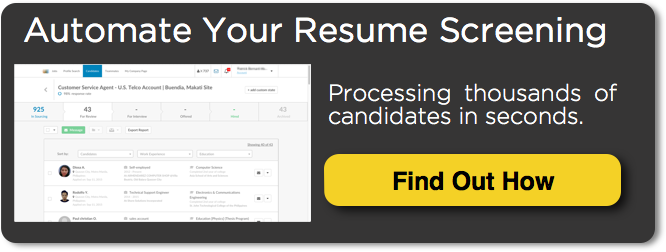Based on the popularity of the original post, we’ve added five more hiring tips to help managers set the best hiring practices for their team.
5 More Hiring Tips for Managers
1. Don’t ask hypothetical questions
Asking hypothetical questions during an interview is similar to teaching students the concepts and theories in class in the hopes that they will apply it in real life—it’s not a guarantee that that is going to happen.
Remember, you already have a high standard and will not just accept anyone on your team. That means that you want the best of the best (just like any other manager does). Asking theoretical questions will give you theoretical answers.
That is very ineffective.
You want people who have done something to produce a positive contribution to their organization. Or, put it in a different light, you want people who behave in certain ways that you already identified at the beginning. Future behavior is best predicted by past behavior.
For example, you want the person to determine if he can meet deadlines while juggling a lot of multiple projects. You ask that in the form of a behavioral question: “Here at Bridge, we juggle a lot of projects. Tell me about a time when you handled multiple projects simultaneously.”
The question asks about a situation the candidate may have previously found himself in. If he handled it well, it demonstrates that the person has the skill and can do exactly what you were looking for. If they do not give you the answer you’re looking for, they may not be equipped to handle the task at hand.
If you are unsure of their answer, but got a sense that the person has it, you can also probe a little bit, perhaps asking, “What was the result and how did you do it?” This allows you to lead the conversation in a specific way.
2. Be aware of common pitfalls
There are a lot of dangers when it comes to hiring. Two of the most common ones worth mentioning are the similar-to-me effect and the halo effect.
The similar-to-me effect is a bias towards a person that is similar to you in terms of interests, physical appearance, and both personal and professional backgrounds. In other words, you tend to like a person who has similar hobbies or work experiences, even if the person really has not produced the results you wanted to see in the beginning.
The halo effect is another bias wherein your overall impression of a person, brand, or organization influences your specific thoughts and feelings about it. For example, if you think of Apple as a great brand, then the halo effect of that is that all products that Apple releases are great. The halo effect also works in a negative way as well. Awareness is the first step to overcoming these cognitive biases.

3. Don’t outsource this function to HRs or recruiters
Hiring is the most important activity any manager does—it is the first step to building your world-class team.
In the Philippines, the usual sequence of events goes like this:
- a member files for resignation
- the manager talks to HR regarding a job opening
- HR asks the manager to fill-in a request for manpower form
After filling out the form, the manager submits it to human resources, asking them to create a job description based on whatever is on file.
The creation of the job description, job advertisement, resume screening, phone screening, and initial interview are all made by human resources. In big companies where multiple divisions and hierarchies exist, HR simply cannot spend that much time with all managers.
The HR professional who has neither experience nor exposure to your area of expertise is now tasked to create a job description, a job advertisement to go out to job portals, to phone screen and conduct initial interviews.
Think about that for one moment.
- What do you think makes them better at creating a job description and a job advertisement than you? Nothing. You, as the manager, are the best person to create this because you know the job and little nuances the job entails.
- What do you think makes them more qualified to screen resumes? Nothing. Even if you meet with them to explain the opening, they will not necessarily know as much about the post as you do.
- Do you think they know exactly what to look for in the roles you have? No—unless that HR professional has work experience related to the role you are trying to fill.
- What do you think they ask during their initial interviews? Recruiters usually just confirm the data applicants wrote in their resumes. This doesn’t necessarily add to the information you’re trying to gather.
Being a manager involves busy work, but time must be set aside in order to prioritize hiring, since it is one of the most crucial tasks assigned to you.
4. Have your team interview them too
One of the most ineffective things managers do is to shield their team from additional work, especially at their level. In other words, they refuse to delegate.
This defeats the easiest way for a company to grow: having the same work output produced at a lower level of cost.
Your team members, especially your top performers, will become managers one day. Coupled with the knowledge that people learn best by doing, what better way to train them than to allow them to interview the potential team member?
If you are following a specific process from screening to decision-making, your team members will be part of this. Encourage them to ask why you decided accordingly.
5. Do you really have to hire?
The biggest lie managers tell themselves is that when your workload increases, you have to hire new people. Following that logic, when work subsides, you have to fire someone on your team. In reality, that never happens.
Question the underlying assumption that your team is operating at a 100%. Most likely, they are nowhere close to that. Think 50% rather than 80%. There’s always room for them to push and grow to fill a need, without having to resort to hiring a new member.

